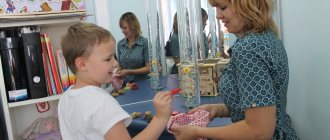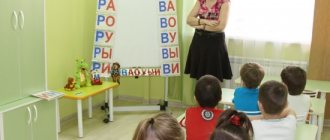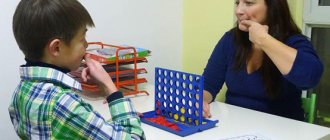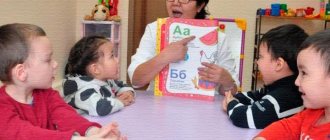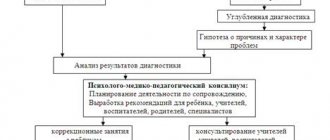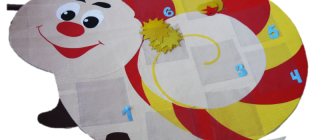Modern speech therapists have in their arsenal many different ways of producing sounds and normalizing speech.
One of the most effective and significant in the eyes of parents is speech therapy massage. This is a very effective modern method of speech therapy, as a result of which it is possible to change the condition of blood vessels, muscles and nerves, and tissues of the peripheral speech apparatus. Speech therapy massage is carried out if there are certain indications. It will be useful for rhinolalia, mechanical dyslalia, stuttering and dysarthria. Massage for dysarthria allows you to prepare the speech apparatus of children for further speech therapy sessions.
What is dysarthria
This is the name for a speech disorder that occurs when there is insufficient innervation of the speech organs. In this condition, the mobility of the speech apparatus is limited. Dysarthric people speak slurredly; they say about such people: “porridge in the mouth.”
Dysarthria can develop in children as a result of injuries, tumors, neuroinfections and other pathologies of the brain and central nervous system. In childhood, in addition to the pronunciation side, other components of the speech system also often suffer. The baby may have hearing impairments and make mistakes when reading or writing. In adulthood, dysarthria develops after strokes or injuries. In this case, only pronunciation suffers.
There are many forms of dysarthria. Today in the world, most experts use a classification that implies the presence of seven types of this speech disorder :
- Sluggish dysarthria is called dysarthria that occurs as a result of damage to the hypoglossal, glossopharyngeal and vagus nerves. Failure of neuromuscular transmission leads to peripheral paralysis of the articulatory muscles. This type may be accompanied by swallowing disorders and is part of the bulbar syndrome.
- Spastic dysarthria is observed with bilateral muscle paralysis, which develops with bilateral damage to the anterior central gyri. This form is included in pseudobulbar syndrome.
- Unilateral upper motor neuron dysarthria is observed with unilateral damage to the central anterior gyri.
- Ataxic dysarthria develops if the lesion affects the cerebellum or its pathways. With this type of disorder, speech becomes scanned, modulation is disrupted, and the volume constantly changes.
- Hyperkinetic dysarthria is a type of extrapyramidal disorder. The reason for its formation is a disruption of the subcortical nodes, as well as their nerve connections. This dysarthria is a hyperkinesis - a condition when muscle movements are involuntary and sudden. Can be combined with hyperkinesis of various locations.
- The hypokinetic form also refers to extrapyramidal dysarthria, which occurs after damage to the subcortical nodes. Most cases are observed in parkinsonism. Speech is inexpressive and slow.
- Mixed dysarthria is called dysarthria, which develops against the background of multifocal damage to the nervous system. Often occurs as a result of injury. In this case, a combination of various mechanisms of dysarthria occurs.
Dysarthria is diagnosed at the age of five . After a speech therapy examination, a child with symptoms of dysarthria is referred to a neurologist. The doctor, after a thorough examination, will refute or confirm the diagnosis, and also prescribe adequate treatment. In addition to medical treatment, dysarthric patients need psychological, pedagogical and speech therapy assistance.
Dysarthria is a speech disorder that is difficult to correct. The prognosis largely depends on the state of dysarthria and the degree of damage to its central nervous system.
Treatment of dysarthria
Dysarthria is not an independent disease. This speech disorder occurs against the background of various pathologies of the nervous system. Although in some cases, it becomes the most striking manifestation of the disease. That is why the diagnosis must be confirmed by a neurologist, who takes into account the opinions of the speech therapist.
Treatment of dysarthria should be comprehensive, including the following methods:
- Drug therapy . Doctors' efforts will be aimed at eliminating the neurological defect. If damage to the central nervous system is not reversible, then medications are prescribed to stabilize the patient's condition.
- Procedures aimed at general strengthening of the body .
- Physiotherapy . For dysarthria, physical therapy, reflexology and acupuncture will be useful. All this allows you to normalize muscle tone and motor ability of the articulation organs.
- Speech therapy classes . It is unlikely that it will be possible to make speech ideal with dysarthria. In most cases, the goal of a speech therapist’s work is to achieve speech that would be understandable to others.
The influence of a speech therapist is to perform articulatory gymnastics, correct the pronunciation of sounds, properly organize speech breathing, and increase the expressiveness of speech. Massage of the organs of articulation is also carried out - speech therapy
The role of speech therapy massage in the treatment of dysarthria
Massage, as a way of influencing certain areas of the body, has long been used in medicine to treat various diseases. It began to be used in speech therapy practice relatively recently. With its help, you can normalize the tone of the articulatory muscles and improve the motor skills of the speech organs. As a result, it is possible to make pronunciation more expressive.
Speech therapy massage is part of a comprehensive speech therapy session. It precedes breathing, articulation and voice exercises. In children, such exposure can be carried out if indicated.
This method of speech therapy is very effective in correcting pronunciation, but if the child has no speech at all, then the massage will be ineffective.
Many researchers have dealt with the problem of correcting severe speech disorders using speech therapy massage. Today, the most common method is the one proposed in her book by E. F. Arkhipova, “Speech therapy massage for dysarthria.” A massage session should consist of several stages:
- relaxing massage . It is carried out for each of the muscle groups involved in speech. The speech therapist performs movements with both hands, light, stroking movements. At this stage, it is important to achieve complete relaxation of the facial muscles. All movements are performed 5–7 times, and no more than three minutes are allocated for a relaxing massage for each zone. This stage is completed by relaxation of the tongue and correction of its pathological shape;
- A strengthening massage is performed when there is pronounced muscle flaccidity. There are different methods of performing strengthening massage; their selection depends on the characteristics of the child’s pathology. The speech therapist can use stroking, pressing, vibration, acupressure, etc. The techniques used help eliminate both hypotonicity of the oral muscles and hyperkinesis of the tongue.
Speech therapy massage can be performed manually or using a special vibration massager. The device has several different attachments, the use of which is carried out in strict accordance with the instructions. Special probes and other devices can also be used.
Speech therapy commission in kindergarten
Many parents want to place their children in speech therapy groups, which are found in combined kindergartens, or directly in a speech therapy kindergarten. Everyone knows that training programs and preparation for school in a speech therapy group are much higher and better than in a regular group. And a certain number of children is provided there: only 10-14 people. Thanks to this, more individual time will be allocated to each child. It is not easy to get into such a group if the child does not have any speech problems.
Usually, recommendations for passing a commission to a speech therapy group are given by the speech therapist of your kindergarten or someone coming from the speech kindergarten, if you don’t have one. Children with speech disorders and those in need of correction are added to the list, which is then announced to their parents. Those who agree to be transferred to a speech therapy group go for an interview at the kindergarten, where they are given a two-sided form - a referral for a preliminary round of doctors before the commission. No one will force parents to visit doctors; this is a voluntary decision.
Parents of the baby who agree to undergo medical examinations must visit the following specialists:
- Oculist.
- Otolaryngologist.
- Neuropathologist.
- Dentist-orthodontist.
- Psychiatrist.
- Pediatrician.
- Surgeon (some kindergartens ask for an additional visit).
When undergoing a medical examination, make sure that the doctors put their signatures and seals on the referral. They issue a referral in advance in order to have time to see all the doctors before the meeting of the PMPC commission (psychological-medical-pedagogical commission).
In addition to a referral with notes from all doctors, you will also need:
- Copy of the child's birth certificate
- Characteristics written by a teacher and speech therapist
- Application for transfer to a speech therapy group
Parents will be notified in advance about what day and where the commission will meet. Usually this happens in the kindergarten itself or in the RONO. Specialists will talk with the child and check for papers and evidence. The composition of the commission may vary in different cities, but, in most cases, it consists of a psychologist, speech pathologist, speech therapist, and representatives of the Regional Educational Institution.
Usually they ask questions about intelligence and logical thinking. They are asked to repeat sound phrases in order to better identify problems in the pronunciation of individual sounds. Judging by the reviews of parents, the conversation with the baby is very short, about 10-15 minutes, and the result is immediately announced.
Representatives of the PMPC commission may ask:
- assemble a pyramid;
- put a circle into a circle, a square into a square, a triangle into a triangle, etc.;
- name the figures;
- name the colors;
- collect body parts of a paper man cut out;
- name the seasons, which one it is now;
- answer who the child is to mother, grandmother, uncle, etc.;
- find an extra item;
- answer spatial questions: where the cat sits (on a chair, under a chair, behind a chair, etc.);
- tell what the people in the picture are doing;
- say words like: stir up, mezzanine, etc. to check the pronunciation of sounds;
- combine objects into groups according to some criteria;
- draw something;
- recite a poem or sing a verse of a song and other questions on pronunciation of sounds, intelligence and logical thinking.
It is better not to teach the child to answer these questions in advance, because the clearer the experts make the diagnosis, the more accurately they will determine measures to correct the problems.
Contraindications
Although speech therapy massage is an absolutely safe procedure, there are still a number of contraindications to such effects. It is strictly forbidden to carry out mechanical effects on the oral muscles in the following cases:
- Fever and acute inflammatory processes.
- Infectious skin diseases, fungus.
- Blood diseases, bleeding and bleeding.
- Trophic dilation of veins.
- Purulent processes in various parts of the body.
- Pathological conditions of blood vessels.
- Active tuberculosis.
- Allergies.
- Tumor formations (malignant and benign).
- 10. Diseases of the abdominal organs.
- 11. Rehabilitation period after surgical operations.
This type of massage should also not be used when working with patients with mental disorders. Especially if they are characterized by excessive excitement.
It will be possible to begin speech therapy classes after complete recovery or the transition of a chronic disease to a sluggish phase.
Sign up for the service
| October 2021 | ||||||
| Mon | W | Wed | Thu | Fri | Sat | Sun |
| 27 | 28 | 29 | 30 | 1 | 2 | 3 |
| 4 | 5 | 6 | 7 | 8 | 9 | 10 |
| 11 | 12 | 13 | 14 | 15 | 16 | 17 |
| 18 | 19 | 20 | 21 | 22 | 23 | 24 |
| 25 | 26 | 27 | 28 | 29 | 30 | 31 |
Tools
During the massage, special devices can be used - special speech therapy probes. Since they are most effective when working with dysarthrics, they are often called dysarthric probes.
For the first time, such devices began to be used in a school for the deaf and dumb, located in Berlin, at the beginning of the last century. Their developer was the director of this school, doctor and teacher of the deaf, A. Gutzman. At that time, there was a fashion for all kinds of technical devices and treatment using mechanical devices. Later, Gutzmann's probes were modernized and used in his practice by the domestic teacher of the deaf and speech therapist F.A. Rau. With minor changes, this modification has survived to this day.
Now there are several types of probes, but the most famous are:
- dysarthric probes Sklyarenko. They were developed in 1992. The set includes fifteen devices made of plastic or metal. Each of the probes is designed to affect a specific area;
- set of speech therapy probes E.V. Novikova includes eight special devices. They must be used according to the original method developed by a speech therapist in 2000.
Probes have only recently become widely used in speech therapy practice.
In the twentieth century, the public was poorly informed about such devices, and they were made almost by hand in a single copy. Despite the fact that today speech therapists have more opportunities to use such tools, few specialists use speech therapy probes and only in particularly severe cases. This is due to the fact that children are frightened by strange metal objects that they try to put in their mouths. Because of this, speech therapists, when working with dysarthric patients, still use medical spatulas, cotton swabs, rubber nipples and other improvised means.
Reviews of speech therapists and speech pathologists
Kharlamova Larisa Petrovna, grandmother of Ilya Ustinov, 8 years old. Classes with a speech therapist:
Many thanks to the staff of the Speech Therapy Center Smile, in particular, speech therapist Lyubov Evgenievna Pugacheva, for their professionalism and creative approach to their work.
In the center itself, all conditions have been created to feel comfortable and exercise. The child walked and studied with great pleasure. The speech therapist competently explains what to do at home and clearly builds a lesson program for the lesson. Previously, I worked with a private speech therapist, but there was no particular result. So there is something to compare with. I recommend this center! Comments and suggestions on the work of the center: Everything is very good.
Milana (Davydov's daughter Tamara, 6 years old). Classes with a speech therapist:
I would like to express my deep gratitude to our speech therapist Elena Sergeevna. She taught my child (age 6-7 years) how to make the sound “R”. It wasn't easy, especially at the beginning. But thanks to the patience and diligence of the speech therapist, the child mastered this difficult letter. I would especially like to note the versatile orientation of the teacher. Elena Sergeevna also began preparing us for school. Thanks to her professional training, Toma began to learn how to retell, count, and write correctly. She conducts classes competently, using modern new teaching methods. Many thanks for her professional approach to her work. Suggestions and wishes: I sincerely wish prosperity and success to your center.
Martanova Natalia (son of Martanov Lev, 4 years old). Classes with a speech therapist:
Problems: Pronunciation of sounds
Review of the work of a speech therapist: I am glad to have the opportunity to leave my review of the work of Valentina Nikolaevna. My child has been studying for two months. Contact with the teacher was established from the first lesson. After just a few lessons, the result of their fruitful work with the child was visible. He always goes to classes with great pleasure and learns a lot of new things. After each lesson, I rejoice at the success of my child and thank Valentina Nikolaevna for her professionalism, attentiveness, participation and individual approach.
Igumenova I.A (son Dima 2 years 10 months). Classes with a speech therapist:
Speech problems: speech disorder, no speech
Feedback about the specialist:
Classes with children are always very interesting. Dima quickly got used to it and does not protest, he studies with pleasure, although at the very beginning it seemed that all his efforts were in vain: the child was uncontrollable, restless, and did not complete tasks. Daria Leonidovna managed to “pick up” the treasured key to Dima’s heart: the child is unrecognizable! I began to understand instructions better, complete tasks and, most importantly, make contact with the teacher. The result of the classes is obvious: Dima has matured before our eyes! Thanks to Daria Leonidovna for her sensitivity and professionalism! I hope she will be able to achieve speech progress from Dmitry!
Wishes to the logo center:
Very good teachers! Individual approach to each child! Thank you “Smile” for helping to develop our children!
Shatunova Elena Vyacheslavovna (daughter of Shatunova Masha, 5 years old). Classes with a speech therapist.
Problems: Defects in the pronunciation of the sounds Ж, Ш, Р
Feedback on the work of a speech therapist: Despite the fact that we have been studying for only three weeks, there is already noticeable progress. The sounds Zh, Sh appeared, and phonemic hearing improved. Classes are held in a playful way, but very productively, using various visual aids. Ekaterina Sergeevna immediately found an approach to the child, managed to interest him and involve him in the learning process, the child is trying.
At the end of each lesson, successes and difficulties are discussed, detailed explanations and recommendations for further work are given.
Ekaterina Sergeevna is an attentive, friendly and result-oriented specialist. We are very pleased, thank you!
Review of the correctional center: Attentive attitude, pleasant atmosphere. I am glad that I contacted this logo center.
Kormilitsina Anastasia (daughter Polina, 6 years old). Classes with a speech therapist.
Speech therapist: Elena Sergeevna
Problems: Can’t pronounce sounds R, L
Feedback about the specialist:
Speech therapist Elena Sergeevna is very attentive, responsive, the child goes to her classes with pleasure. There are already first results from the lessons. The teacher does his job well.
Wishes to the logo center: We are very glad that we came to this center; excellent teachers work here!
Good luck and prosperity to the logo center!
Leonova Maria (son Ivan, 5 years old). Classes with a speech therapist.
Problems: General speech underdevelopment. Feedback about the teacher: Yulia Yuryevna is a wonderful teacher! A professional in his field! The classes are very interesting, in a friendly atmosphere, he quickly finds an approach, and knows how to interest and motivate the child in the classes. There are positive dynamics.
Egorova Nadezhda (child Egorova Maria, 5.4 years old). Classes with a speech therapist-defectologist:
Problems: Poor pronunciation of sounds (S, Z, Ts, Sh, Zh, R, L), poor coordination of movements, short frenulum of the tongue, bite defects. Result of the classes: When we turned to speech therapist Margarita Albertovna, Masha’s speech left much to be desired and did not live up to her age. We trained three times a week. Margarita Albertovna was able to captivate Maria and get her talking. At each lesson there were games that developed attention, memory, fine motor skills and coordination, so my daughter enjoyed studying. We thank Margarita Albertovna for promptly referring us to the dentist to eliminate the short frenulum and malocclusion. Within a year we have installed all the sounds and can already use them freely (at home we try to keep this under control).
Masha's speech condition has improved noticeably and we are almost closer to normal. We want to continue classes along with learning to read.
We wish the logo center to expand so that more children can study there and receive qualified assistance.
Classes with a speech therapist. Vera Igorevna - (son of Chelnokov Mikhail, 6.5 years old):
Problems: Defects in the pronunciation of the sounds L, L, R, R.
Feedback about the teacher: I think the work of the speech therapist is excellent. In a fairly short time, 2 sounds were staged, the remaining ones are now being staged - there are already results. The child goes to classes with pleasure. The speech therapist has sufficient rigor to cope with the child’s laziness (which, in my opinion, is a very important quality of a teacher). The classes themselves are interesting, dynamic, with elements of developing logical thinking.
Feedback about the logo center: I did not regret at all turning to this logo center. I am completely satisfied with the price-quality ratio. Reviews are the best! Proximity to home, low prices, excellent quality of work from specialists, attentive attitude. We are very pleased! Thanks for your work.
Shakhova Ekaterina Sergeevna (son of Durov Artyom, 2.3 years old). Classes with a speech therapist-defectologist:
Zemina Elena Evgenievna quickly found contact with my son. Used various technologies and techniques. Gave the necessary recommendations. The classes were easy and relaxed in a playful way. We are happy to use all her recommendations at home and practice them daily as homework. The teacher comes from the “child”, which gives good results. Thank you very much for your work and care! Special thanks to the management of Logo for the professionalism of highly qualified specialists.
Bulgaru Elena Nikolaevna (son: Bulgaru Maxim, 3 years 7 months). Classes with a speech therapist:
Problem: Delayed speech development (SDD)
We went to speech therapist Olga Sergeevna for several months, our teacher helped the baby begin to repeat the first syllables and small monosyllabic words in words, that is, we developed onomatopoeia. The first stage of speech in a child is great progress for us. Olga Sergeevna is a very attentive teacher. After each lesson, I gave the child homework to reinforce the material. Every time I came up with something new to learn new sounds, letters and words. We are glad that we visited the Speech Therapy. The prices are also very reasonable here.
Tsvetkova Christina (son: Tsvetkov Denis 6 years old). Classes with a speech therapist-defectologist:
- Phone number and name of the parent who wrote the review: Christina Tsvetkova, 8-967-079-54-**
- Email: red*** [email protected]
- Teacher's name: Potasheva Elena Sergeevna
- Effectiveness of classes: all sounds are introduced into speech
Reason for contact: problems with pronunciation of the sounds “L”, “R”, “R”
Elena Sergeevna is very attentive and responsive. The classes are very interesting, using books and board games. The child goes to classes with great pleasure.
Ilyina Irina (daughter: Ilyina Anna, 3.5 years old). Classes with a speech therapist:
We really liked the teacher! The classes were held in a friendly atmosphere, varied and interesting. The main thing is that there are changes for the better. The child can already compose stories from the pictures. The vocabulary has improved (including verbs, nouns). In general, the child has become able to communicate clearly and well. Olga Sergeevna always gives comments on classes and what to pay attention to when doing homework. We are glad that we got to Olga Sergeevna, because we got results and want to continue our studies in the future. Thank you!
What to do at home
To ensure continuous treatment, experts recommend massage of the speech and facial organs at home. You can study at home at any convenient time, and it’s easier for children to trust loved ones.
You can use the following massage techniques yourself:
- Finger massage . This is done using a handkerchief or cloth napkin. You can also use finger pads, sold in regular pharmacies.
- Massage with teaspoons . They can be used on the face and to warm up the tongue. In this case, the spoon will serve as a speech therapy probe. Before the massage, you need to wash it well and pour boiling water over it.
- Using a toothbrush . The villi will help to stretch your tongue well. With a brush, you can make circular movements over the entire area of the tongue, imitate cleaning, treat the lower part, and also the sublingual fossa. It should be remembered that for massage you need to use a new brush, specially purchased for classes.
At home, massage can be performed once or twice a day for 15 minutes. Depending on the form of dysarthria, a massage course can last two or three weeks.
Mastering massage techniques is quite easy. A speech therapist will help you with this. He will select a set of exercises depending on the diagnosis, age and severity of the disorders.
What you need to know
Despite the fact that speech therapy massage for dysarthria can be performed at home, it should not be done without prior consultation with a speech therapist and neurologist. If you use mechanical influence techniques incorrectly, you can harm a child suffering from dysarthria.
For speech therapy massage to be beneficial, you must follow these recommendations:
- Dysarthria is treated by a doctor. All stages must be supervised by specialists;
- a friendly atmosphere should reign during classes;
- The child should lie down during a speech therapy massage. But in some cases, it is possible to perform exercises while sitting;
- Speech therapy massage will be effective only with an integrated approach. It should be understood that the mechanical effect on the speech muscles must necessarily be combined with work on producing sounds and speech breathing, and the development of fine motor skills.
As a rule, speech disorders in children are diagnosed at the age of five. But if your child is at risk or you notice problems with pronunciation, then you should immediately contact a specialist. After all, the sooner you start speech therapy massage sessions for dysarthria, the more successful the treatment will be.
Finding a good speech therapist today is quite easy. But it is important to evaluate not only the professionalism of the selected specialist. It is very important that he finds contact with your child. The child should be happy to go to class, then the effect of the work done will be more noticeable. This rule also applies to doctors.
Sensitive, competent specialists conduct consultations at the Moscow City Psychoendocrinological Center. Here you can get advice from doctors of various specialties.
- the largest network of speech therapy offices in Moscow and the Moscow region. What allows us to remain the undisputed leader in the speech therapy industry, and why every year thousands of people choose us and entrust their children to the gentle hands of our specialists?
One of the most important selection criteria for absolutely every parent is the professionalism of the speech therapist, his experience and ability to handle children. After all, many people don’t even think that a speech therapist has a huge knowledge base related to psychology and the study of reflexes, anatomy, neurophysiology and other complex areas of science. When hiring our specialists, they undergo a five-stage selection process, during which almost 87% of candidates are eliminated, and the best of the best get the job. Every year, specialists improve their skills, attend courses, educational seminars and trainings, regularly exchange experiences and personal experiences with other colleagues, and work as a single organism aimed at ridding people of speech defects.
We give you the opportunity to purchase classes on credit or in installments, so that you can make your life and the life of your child happy as much as possible and without cost. You will be able to comfortably allocate a certain amount per month for yourself and your quality of life, and it will not cost you critically large amounts of money for your annual budget. You will be able to distribute as conveniently as possible the amount of money that you agree to spend per month on classes with a speech therapist, formalize everything and start working. All our speech therapy centers are marked on the map in a special way, so you can choose the one closest to you and make an appointment. However, if there is no speech therapy office nearby, and for one reason or another you cannot come to us a little further, then you have the option of inviting a speech therapist to your home, or conducting classes and diagnostics via Skype. This is especially suitable for those who have more than one child, a heavy workload, or have any contraindications for visiting public places. You will save energy, time and money spent on the road. It’s especially pleasant to study in a familiar home atmosphere; the house and the walls help.
According to statistics, home exercises are much more effective and give positive dynamics faster. You can find a complete collection of addresses of speech therapy centers on the website. Choose your city and look at the speech therapy office that is closest to your place of residence or which will be easiest for you to get to.
